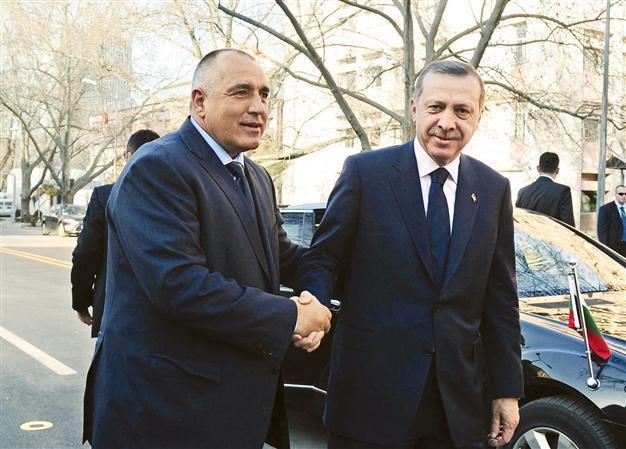Ankara, Sofia hold joint Cabinet session
ANKARA - Hürriyet Daily News

Prime Minister Erdoğan (R) welcomes his Bulgarian counterpart, Boyko Borisov. AA photo
Turkey and Bulgaria held their first “joint Cabinet meeting” as part of a newly inaugurated High-Level Cooperation Council mechanism aimed at deepening economic ties and political consultations between the two neighbors.Prime ministers Recep Tayyip Erdoğan of Turkey and Boyko Borisov of Bulgaria chaired the gathering, attended by about 10 ministers from each side, and also met separately face-to-face. Borisov was received by President Abdullah Gül earlier in the day.
The new cooperation mechanism aims to “accelerate bilateral ties under a new vision and deepen cooperation on the basis of concrete projects,” Erdoğan’s office said ahead of the meetings, which were still under way when the Hürriyet Daily news went to print.
The agreements the two sides were set to ink included deals on economic cooperation, the encouragement of mutual investment and cooperation in the tourism sector as well as accords on the preservation of historical heritage and the mutual opening of cultural centers. Other accords covered cooperation in the fields of transport, environment and defense.
The High-Level Cooperation Council is a platform of regular discussions between top officials that Ankara also launched with Greece, Russia, Iraq and Syria as part of its foreign policy vision of “zero problems with neighbors.” The policy, however, has taken serious blows amid nose-diving ties with Damascus over the bloody uprising there and the sectarian tensions in Iraq.
Bulgaria remains a neighbor with whom ties have steadily flourished since the Balkan country’s Communist regime collapsed in 1989. Borisov’s visit came in the wake of a landmark declaration the Bulgarian Parliament adopted in January condemning the assimilation campaign the Communist regime had forced on the Turkish minority, at the expense of plunging bilateral ties to an all-time low. The visiting delegation included Bulgaria’s Culture Minister Vejdi Rashidov, a prominent sculptor of Turkish origin.
One of the more significant projects sought by Sofia is the construction of a short pipeline that would connect the two countries’ domestic gas networks in a bid to diversify Bulgaria’s energy supplies, which are currently dependent on Russia.
















